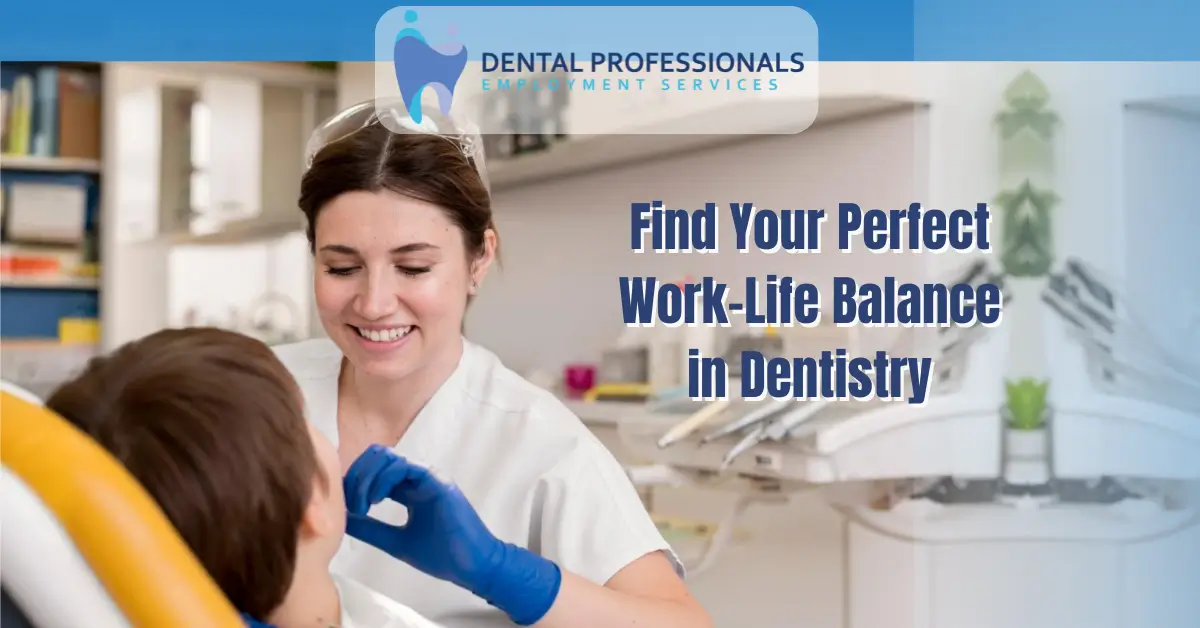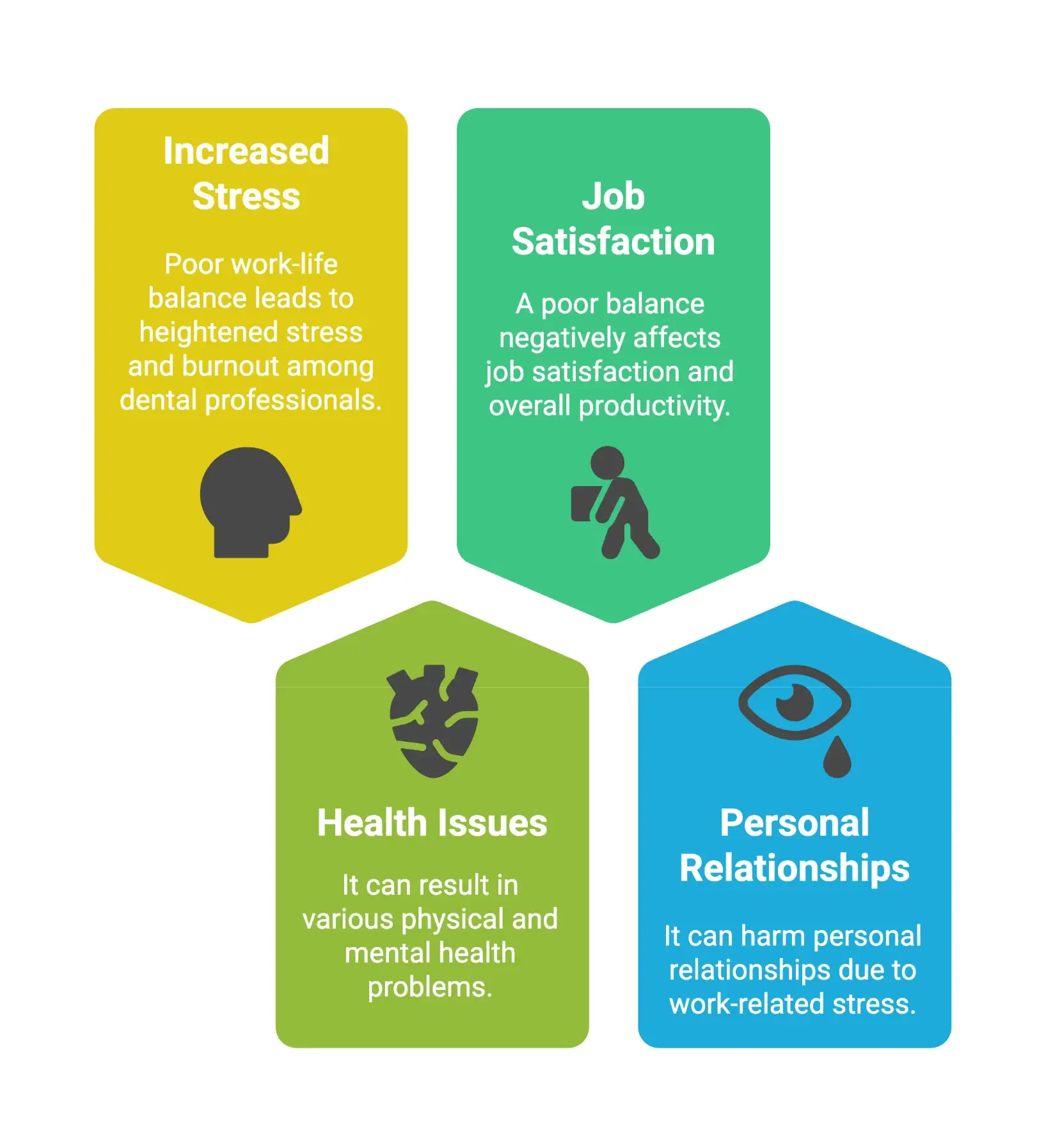Work-Life Balance in Dentistry: Finding the Right Fit

In the demanding world of dentistry, achieving a harmonious work-life balance is a universal challenge. The relentless pursuit of professional excellence can often overshadow personal well-being, leading to burnout and dissatisfaction. However, striking the right balance is not only possible but essential for long-term success and fulfillment. This blog explores the significance of work-life balance in dentistry and offers valuable insights on finding the right fit for a fulfilling and sustainable career.
The Impact of Poor Work-Life Balance in Dentistry

Maintaining a healthy work-life balance as a dental professional is often difficult due to long hours, demanding patients, and the pressure to succeed. The consequences of poor balance include:
1. Increased Stress and Burnout
- A Journal of the American Dental Association study found that 79% of dentists report moderate to high stress levels, and 24% experience burnout.
- Chronic stress can impact mental and physical health, affecting overall job performance and patient care.
2. Physical and Mental Health Issues
- Dentists are at higher risk for musculoskeletal disorders, cardiovascular disease, and mental health conditions like anxiety and depression.
- Poor self-care can lead to decreased career longevity and personal dissatisfaction.
3. Declining Job Satisfaction and Productivity
- Overworked and stressed dentists may feel disengaged from their profession, impacting their ability to provide top-quality care.
4. Negative Effects on Personal Relationships
- Missing family events and social activities due to work commitments can lead to isolation and strained relationships.
Prioritizing work-life balance is essential for a sustainable and fulfilling career. But how can dental professionals achieve this?
Finding the Right Work Model for You
There is no one-size-fits-all approach to work-life balance in dentistry. Finding the right fit depends on personal priorities, career goals, and preferred practice models. Here are some flexible career paths to consider:
1. Solo Practice
- Provides autonomy but requires significant responsibility.
2. Group Practice
- Shared workload and resources can improve scheduling flexibility.
3. Associateship
- Offers structured hours with reduced administrative burden.
4. Dental Support Organizations (DSOs)
- Handles administrative tasks, allowing dentists to focus on patient care.
5. Mobile Dentistry
- Offers flexibility by providing care in different locations.
6. Part-Time or Locum Tenens
- Allows dentists to control their schedule and work on a temporary basis.
How Dental Professionals Can Help You Achieve Balance
Dental Professionals, a premier staffing agency in the Pacific Northwest, offers flexible employment opportunities tailored to your work-life balance goals. Their services include:
- Temporary & Permanent Placements: Find roles that align with your lifestyle.
- The Dental Professionals App: Manage schedules, book assignments, and submit timesheets with ease.
- Competitive Pay & Benefits: Enjoy industry-leading wages, healthcare, and retirement plans.
What Dentists Are Saying
Here’s how Dental Professionals has helped dental professionals regain control over their work-life balance:
“Dental Professionals has been the answer to my dreams. I choose when and where I want to work and get paid top dollar for my skills.” – Valerie C., Google Review
“With my busy schedule of working in two separate offices, temping, and family life, they are understanding and patient with my needs.” – Libby W., Yelp Review
Expert Tips for Maintaining Work-Life Balance in Dentistry
Achieving a healthy work-life balance in dentistry requires intentional effort and strategic planning. Here are some expert tips to help dentists reduce stress and find more time for personal well-being:
- Prioritize Time Management: Use scheduling software to optimize patient appointments and minimize administrative overload.
- Delegate Administrative Tasks: Hiring office staff or outsourcing tasks like billing and insurance processing can free up valuable time.
- Embrace Technology: Utilize digital patient records, automated appointment reminders, and teledentistry to streamline operations.
- Set Boundaries: Establish clear work hours and avoid checking emails or taking calls outside of those times.
- Invest in Self-Care: Regular exercise, mindfulness practices, and hobbies can reduce burnout and improve overall well-being.
- Seek Professional Support: Consider joining dental associations or mentorship programs to gain insights from peers who have successfully balanced work and life.
Comparison of Practice Models for Work-Life Balance
Different practice models offer varying levels of flexibility and autonomy, impacting a dentist’s ability to maintain work-life balance. Here’s a comparison of common practice models:
Practice Model | Work-Life Balance | Pros | Cons |
Solo Practice | Challenging | Full control, higher income potential | High administrative burden, long hours |
Group Practice | Moderate | Shared responsibilities, professional collaboration | Less autonomy, potential conflicts |
Better | Business support, reduced admin work | Less decision-making power, corporate structure | |
Mobile Dentistry | Flexible | Ability to set own schedule, work in different locations | Travel required, variable income |
Academia/Research | High | Predictable hours, intellectual engagement | Lower income compared to private practice |
Choosing the right practice model depends on personal preferences, career goals, and lifestyle priorities. Dentists seeking a better work-life balance may find DSOs, group practices, or academia to be more accommodating than solo practice.
Take Control of Your Career Today
Achieving work-life balance starts with choosing the right opportunities. Dental Professionals can connect you with flexible roles that fit your needs, ensuring career satisfaction and well-being.
Call us today at 206-767-4851 or email dp@dentalp.com to explore opportunities that support your work-life balance in dentistry.

